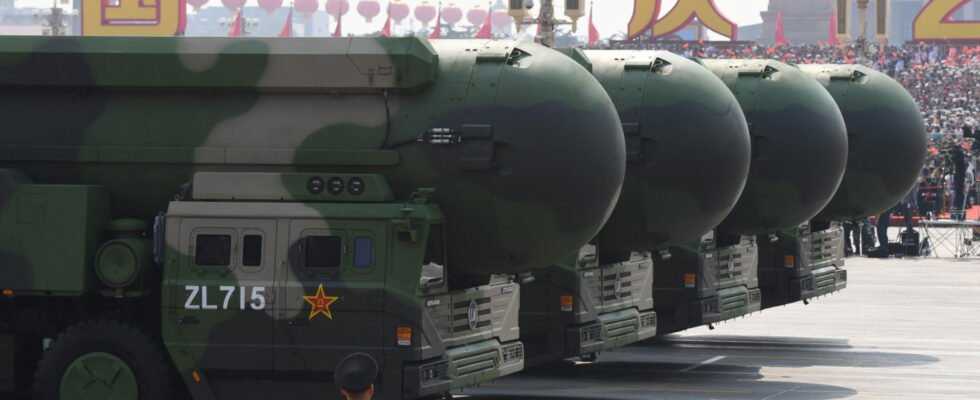The five permanent members of the UN Security Council pledged Monday, against the backdrop of serious international tensions, to “prevent the further dissemination” of the supreme weapon, saying that a nuclear war could not be won. Before the 10th Review Conference of the Non-Proliferation Treaty (NPT), scheduled for January but postponed to a later date due to the covid-19 pandemic, the five powers (United States, China, Russia, United Uni and France) have tried to reassure world public opinion about the risks of an obviously cataclysmic confrontation.
In the midst of negotiations with Iran, suspected of wanting to acquire the atomic bomb, they underline their “desire to work with all States to set up a security environment allowing further progress to be made in the area of disarmament, with the ultimate objective is a world free of nuclear weapons, “according to a statement from the French presidency, which has coordinated the work of these countries for two years.
“Each of us intends to maintain and further strengthen our national measures intended to prevent the unauthorized or unintentional use of nuclear weapons,” continues the text, published one week before a Russian-American negotiation in Geneva on the nuclear arms control treaties and the situation on the Russian-Ukrainian border.
“A nuclear war cannot be won”
“We affirm that a nuclear war cannot be won and must never be waged”, finally assert the signatories, insisting that these weapons “as long as they exist, must serve for defensive purposes, deterrence and prevention of war”.
This concept of an unmanageable nuclear war was first mentioned in 1985 in Geneva by the Russian heads of state Mikhail Gorbachev and the American Ronald Reagan. But “it had never been taken over by the group of five”, underlines Marc Finaud, expert in the proliferation of weapons at the Geneva Security Policy Center (GCSP). “They have taken the initiative and accepted the resumption of this doctrine” that many countries and civil societies are demanding, he added to AFP. “There is this desire to reassure to tell the world that all these concerns about the risk of nuclear war are unfounded.”
In fact, declarations have multiplied in recent months on the volatile nature of global geopolitics, between Sino-American tensions over Taiwan and the Indo-Pacific, the noise of boots in Ukraine and other multiple crises in the Near and Middle East, devastating consequences. of Covid-19.
“Nuclear annihilation is a sword of Damocles”
UN Secretary General Antonio Guterres himself sounded the alarm in December from a platform. “Considering the stockpiling of more than 13,000 nuclear weapons in arsenals around the world, how long can our luck last?” He wondered. “Nuclear annihilation is a sword of Damocles: it would take a misunderstanding or a mistake of judgment to bring not only suffering and death on an appalling scale, but also the end of all life on Earth.”
The NPT, which entered into force in 1970 to prevent the spread of nuclear weapons, has 191 states parties. The five signatories are the five states legally recognized as “equipped with nuclear weapons” by the treaty. Three other countries considered to have the atomic bomb – India, Pakistan and Israel – are non-signatories. North Korea, for its part, denounced the NPT.
Will the Iranian nuclear deal relaunch soon?
These statements also come as negotiations resumed in December in Vienna to relaunch the 2015 agreement on the Iranian nuclear program (JCPOA), which had become moribund after the withdrawal of the United States in 2018. On Monday, Moscow welcomed this agreement in principle between the big five, hoping that it “would help to reduce the level of international tensions”, according to a press release from the Russian Foreign Ministry. Kremlin spokesman Dmitry Peskov, for his part, told RIA Novosti that Moscow still considered “necessary” a summit of nuclear powers.
The joint statement “will help to increase mutual trust and replace competition between the great powers with coordination and cooperation,” the official New China news agency said, citing Deputy Foreign Minister Ma Zhaoxu.
